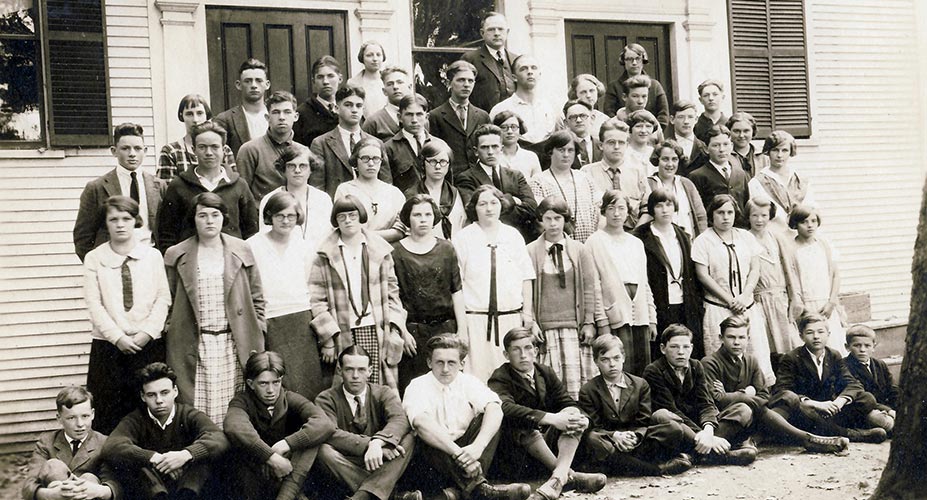Thetford Academy opened in February 1819, and was chartered by the State of Vermont on October 29, 1819. The constitution of Vermont called for free elementary schools in each town, a school in each county for studies above the elementary level, and one university for the state.
The terms Grammar School and Academy were used interchangeably to describe the second level of a three-level system. These schools prepared students in classical languages, mathematics, “natural philosophy,” and the arts for entrance into colleges and universities, and careers in ministry, law, medicine, and teaching.
By the time Thetford Academy was founded, girls were being admitted to some academies (usually in the summer term) for studies which were advanced beyond the common schools, but which were not intended to prepare for college. Thetford Academy admitted both boys and girls from its founding.
Early descriptions of the school describe its founding principles and extol the benefits of its rural location. “Thetford Academy is situated in the pleasant and quiet village of Thetford, Vt., two miles from the Connecticut and Passumpsic Railroad. The location is remarkably healthy, and free from business, excitement, and every temptation to lateness and dissipation. The society is characterized by intelligence and morality, and a deep interest is felt in the welfare of the students and the prosperity of the school.”
“The School is divided into two departments, English and Classical. Instruction is given in the Elementary and Higher English Branches, Latin, Greek, French, Drawing, Painting, and Music. Students are fitted for College, for professional teachers, or for business. The regulations require the students to regard all the proprieties of a sober, industrious and enlightened religious community. The teachers aim not to teach a sectarian creed, but to inculcate the great principles of morality and religion.”
“The government of the School is intended to be mild and generous, but firm and decided. An effort will be made to excite in the mind of the pupil a love of study, and a determination to act, and to act aright, and the presence of those who are not, and cannot be influenced to be, thus inclined, is not desired, and will not be tolerated.”
—1864 Thetford Academy catalog
In 1906, Vermont passed a law requiring all towns to provide advanced instruction either by maintaining a school or by paying tuition for their children to attend schools which already existed. The new law went into effect in April, 1907, and Thetford Academy appears on a list of approved Secondary Schools published the following year. From this time on, the Academy gradually changed its curriculum to meet the broadening needs of all the town’s young people.
The Academy’s growth in the twentieth century was largely due to the dedication and lifelong effort of Carl Anderson, principal for 36 years (1925-1961), his successor Ruel Barrett, who served for 16 years (1961-1977), and Frederick G. Torrey, head of school for 12 years (1977-1989). After the loss by fire of the original building, they rebuilt and expanded Thetford Academy to include the seventh and eighth grades, constructed the science and agriculture building, initiated a commitment to technology, and opened the school’s doors to the children of towns that designate the Academy as their high school or have school choice.
The 1967 by-laws for TA state: “The school shall be known as a ‘Junior-Senior High School’ and shall provide an adequate course of instruction for the proper education of students at the Junior High School and Secondary School levels.”
Into the Twenty-First Century
Under Head of School Martha Rich (1991-2010), Thetford Academy’s enrollment grew and its programming expanded, as the Town of Thetford became more diverse and the school began to attract more students from sending towns. Late in her tenure, the school underwent a capital project to build a new gymnasium, theater, and science facility. The state-of-the-art Martha Jane Rich Theater is indicative of the quality of Thetford Academy’s arts programs, of which Rich was an avid supporter.
William Bugg became Head of School in 2012, after two one-year interim heads. During his tenure, Bugg led the expansion of TA’s course offerings, purchase of the 10-acre property south of the Academy, and the launch of the Thetford Outdoor Program (TOP). In July 2019, Bugg left TA to lead Good Hope Country Day School in St. Croix, U.S. Virgin Islands.
Carrie Brennan, a Dartmouth College graduate who taught at Hanover High School from 1988 to 1990, returned to the Upper Valley in 2019 to join TA as Head of School. Brennan spent most of her education career in Tucson, AZ (1992-2019), where most recently she had served as the founding principal of an innovative charter school.






